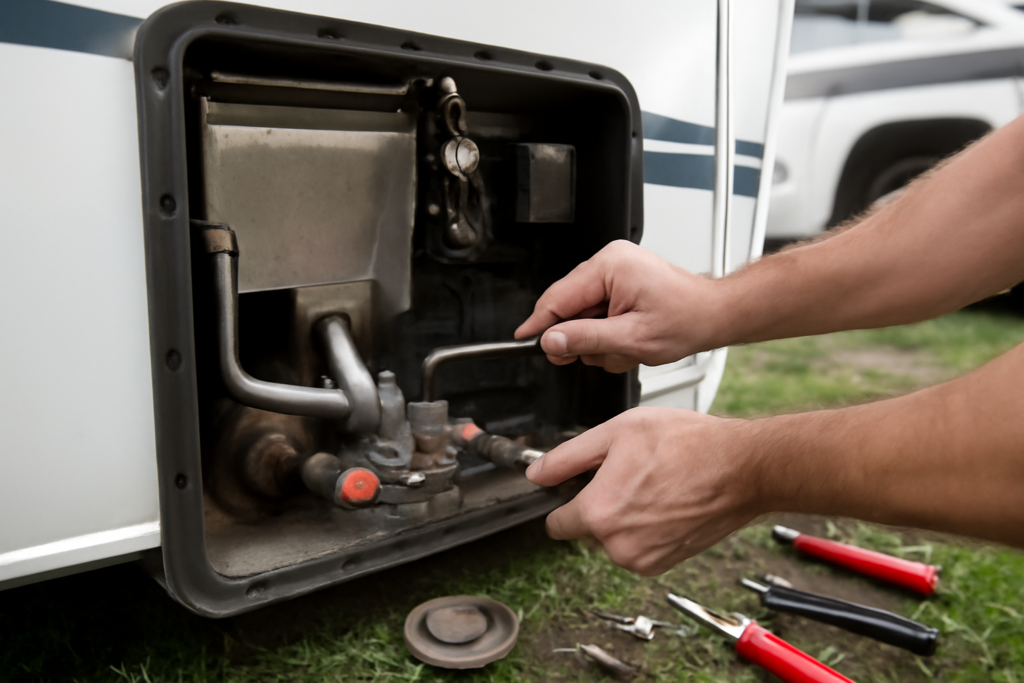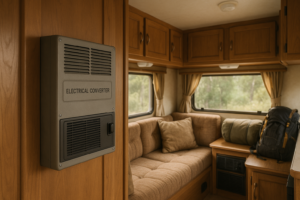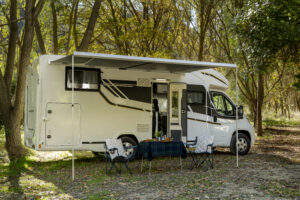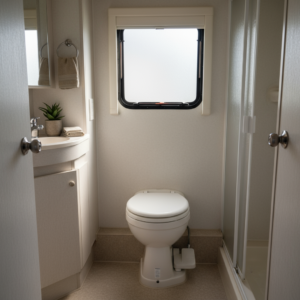
RV Water Heater Not Working? Troubleshooting Guide for Quick Fixes and Long-Term Solutions
Table of Contents
Few things are more frustrating on the road than discovering your RV water heater isn’t working—especially when you’re relying on it for a warm shower, doing dishes, or just making life on the move more comfortable. Whether you’re experiencing no hot water in your RV, a water heater that won’t turn on, or just lukewarm output, the issue can disrupt your entire travel experience.
The good news? Most RV water heater problems can be identified and resolved quickly with the right approach. This guide is here to help you troubleshoot step-by-step, understand how your RV hot water system works, and decide whether it’s something you can fix yourself—or if it’s time to call for help.
You’ll learn how to check components like the thermostat, circuit breaker, fuse, and bypass valve, and understand how different types of systems—propane, electric, or tankless RV water heaters—operate. And if you find yourself stuck mid-trip, we’ll also point you toward reliable solutions that can get you back up and running safely.
Let’s get started by first understanding what kind of RV water heater you have and how it functions.
Understand Your RV Water Heater System
Before you start troubleshooting why your RV water heater isn’t working, it’s important to understand how your system operates. Not all RV water heaters are the same—and knowing which type you have can make all the difference in diagnosing and fixing the issue efficiently.
Types of RV Water Heaters
There are three main types of water heaters commonly found in RVs:
- Propane (Gas) Water Heaters: These rely on LP gas to heat the water. If your pilot light won’t stay lit or you hear clicking but no ignition, the problem likely lies within the gas supply or ignition system.
- Electric Water Heaters: These models use electricity to heat the tank. A blown fuse, tripped circuit breaker, or faulty heating element may prevent the system from turning on.
- Hybrid (Gas + Electric) Water Heaters: These give you the flexibility to run on either gas or electricity—or both for faster heating. If you’re not getting hot water, you may need to check both systems individually.
- Tankless (On-Demand) Water Heaters: These provide hot water as needed and are more energy-efficient, but they can be more sensitive to low water pressure or inconsistent power supply.
Knowing the type of RV water heater you have will help you narrow down the possible causes when things go wrong.
Key Components You Should Know
Here are some parts you may need to inspect during the troubleshooting process:
- Thermostat: Regulates water temperature. If the water is too cold or too hot, it might be the culprit.
- Anode Rod: Helps prevent corrosion in tank models. If your water smells like rotten eggs or looks discolored, this rod could be deteriorating.
- Bypass Valve: Often used during winterization. If left open, it can prevent hot water from reaching your faucets.
- Ignition Switch / Control Panel: Where you activate the system. Check here first if the water heater won’t turn on.
- Circuit Breaker / Fuse Box: A tripped breaker or blown fuse can cut power to your electric RV water heater entirely.
- Reset Buttons (for Suburban models): Some Suburban RV water heaters have high-limit and thermostat reset buttons located under a rubber cover on the tank’s exterior. If the heater isn’t working on electric power, pressing these may reset the system.
By understanding how these parts work together—and which ones are specific to your heater’s design—you’ll be better equipped to spot where things are going wrong.
Next, let’s walk through the first checks you should perform before diving into in-depth repairs.
Quick First Checks Before Troubleshooting
Before diving into detailed RV water heater troubleshooting, it’s smart to rule out a few basic but common issues. These quick checks can save you time and may even resolve the problem without further work.
Confirm Power or Propane Supply
- Electric water heater? Make sure your RV is connected to shore power or your generator is running properly.
- Gas water heater? Check your propane levels. If the tank is empty or the valve is closed, the burner won’t ignite.
- Also, verify that your propane detector hasn’t triggered a shutoff for safety.
Check the Water Heater Switch and Control Panel
Look at the control panel or wall switch for your RV water heater. Is it turned on? Some systems have both interior and exterior switches—ensure both are activated.
Also, listen for the clicking sound when the igniter attempts to fire up (for gas models). If you don’t hear it, the issue could be electrical or related to the control board.
Inspect the Bypass Valve
If you recently winterized your RV, your water heater bypass valve may still be open. When open, it redirects water away from the heater—resulting in no hot water at your faucets even if the tank is working properly.
Make sure the bypass valve is set to “normal” or “in-use” mode.
Look for Error Codes or Indicator Lights
Modern RV water heaters, especially tankless or hybrid models, often display error codes or lights when something goes wrong. Refer to your owner’s manual to decode these messages—it could point directly to the issue (e.g., flame failure, ignition lockout, overheating).
Sniff for Gas Leaks
If you’re using a propane RV water heater and notice a rotten egg smell, turn off the propane supply immediately and ventilate your RV. A leak could be dangerous and should be handled by a professional.
Check Circuit Breaker or Fuse
For electric water heaters, inspect your RV’s breaker panel. A tripped breaker or blown fuse can easily cut off power to the heater. Reset the breaker or replace the fuse if needed.
Once you’ve completed these initial checks and your RV water heater still isn’t working, it’s time to dig deeper. In the next section, we’ll walk through how to troubleshoot specific symptoms and get your hot water flowing again.
Troubleshooting by Symptom
If your RV water heater isn’t working even after the basic checks, it’s time to identify the issue based on the symptoms you’re experiencing. Pinpointing the exact problem can help you avoid unnecessary repairs and focus your efforts where they matter most.
1. No Hot Water at All
If you’re getting cold water from every faucet, your RV hot water system may not be heating at all.
Possible Causes:
- Water heater is off (check both interior and exterior switches)
- Bypass valve is still in winterization mode
- Electric element or gas burner is faulty
- Power supply interruption or empty propane tank
What You Can Do:
- Confirm both power and propane supply are working
- Check that the water heater is actually turned on
- Reset the circuit breaker or replace the fuse
- Switch to propane if electric isn’t working—or vice versa on hybrid models
2. Water Heater Won’t Turn On
When your RV water heater won’t turn on at all—no light, no heat, no clicking—it’s likely an electrical or control issue.
Possible Causes:
- Blown fuse or tripped breaker
- Faulty thermostat or control board
- Loose wiring or corroded connectors
What You Can Do:
- Inspect and replace the fuse if necessary
- Reset the circuit breaker at your RV’s power panel
- Use a multimeter to test voltage at the thermostat or control board
- Check wiring harness for loose or burnt connections
3. Water Only Comes Out Cold (Even When Heater Is On)
If water flows normally but never gets warm, your tank may be bypassed or not filling correctly.
Possible Causes:
- Bypass valve still open after winterization
- Sediment buildup inside the tank
- Faulty mixing valve
What You Can Do:
- Ensure the bypass valve is in the correct position
- Flush the tank to remove sediment
- Inspect or replace the mixing valve if water temperature is inconsistent
4. Pilot Light Won’t Stay Lit
If you’re using a propane RV water heater and the pilot light keeps going out, ignition or airflow issues are likely.
Possible Causes:
- Dirty thermocouple or burner tube
- Faulty gas regulator
- Blocked airflow or insect debris in the burner assembly
What You Can Do:
- Clean the thermocouple and burner assembly
- Make sure airflow is unobstructed (check vents and screens)
- If the problem persists, test gas pressure or replace the thermocouple
5. Discolored or Smelly Water
If your hot water smells like rotten eggs or comes out rusty, your tank may be experiencing internal corrosion.
Possible Causes:
- Deteriorated anode rod
- Bacteria buildup in the tank
- Rust or sediment accumulation
What You Can Do:
- Flush the tank with a vinegar-water solution
- Inspect and replace the anode rod if it’s heavily corroded
- Avoid using stagnant water in the fresh water tank for extended periods
Troubleshooting your RV water heater based on the symptoms you observe is the fastest way to identify what’s wrong. But not every issue can be fixed with DIY steps—especially if the problem involves gas lines, complex wiring, or a leaking tank.
Next, let’s look at when it’s time to stop troubleshooting and call in a professional.
When to Call a Professional
While many RV water heater problems can be resolved with simple checks or part replacements, some issues require professional expertise—especially when your safety or the integrity of your RV is at risk.
If your RV water heater still isn’t working after basic troubleshooting, or if you’re dealing with complex mechanical or electrical faults, don’t hesitate to reach out for help.
Signs You Should Call a Professional:
- Leaking water heater tank or visible corrosion around fittings
- Persistent ignition failure on propane models, even after cleaning and resetting
- Repeatedly tripping circuit breakers or blowing fuses
- Burnt wiring smells or signs of electrical short circuits
- Water temperature is dangerously high or fluctuates erratically
- You’re uncomfortable working with propane, gas regulators, or electrical systems
Trying to fix these problems yourself could cause further damage or create safety hazards—especially if you’re dealing with pressurized gas or live electrical components.
Need Help On the Road?
If you’re in the middle of a trip or far from a repair shop, you don’t have to navigate the problem alone.
With Good Sam RV ProCare, you get access to onsite technician support, unlimited towing to the nearest qualified service center, and a network of over 30,000 trusted service specialists. Whether you’re dealing with a water heater issue or something more serious, help is just a call away.
Knowing when to call a professional not only protects your RV—it saves you from costly mistakes and downtime. Up next, let’s look at how to prevent common water heater problems with regular maintenance.
Preventive Maintenance Tips
The best way to avoid unexpected RV water heater problems is through regular, preventive maintenance. A few simple tasks can extend the life of your water heater, ensure consistent performance, and reduce the chances of costly repairs while you’re on the road.
Here’s what you should include in your routine:
1. Flush the Water Heater Tank Regularly
Over time, mineral deposits and sediment build up inside the tank, reducing heating efficiency and potentially damaging internal components.
- Drain and flush the tank every few months, especially if you travel frequently or use hard water.
- For deeper cleaning, use a vinegar and water solution to break down stubborn deposits.
2. Inspect and Replace the Anode Rod
If you have a tank-style RV water heater, the anode rod helps prevent corrosion by attracting mineral deposits.
- Check the rod at least once a year or more often if your water smells bad or appears rusty.
- Replace it when it’s heavily corroded or worn down to ensure your tank stays protected.
3. Test the Pressure-Relief Valve
This safety valve releases pressure if your water heater overheats.
- Lift the valve tab to ensure water flows freely—if it doesn’t, replace it.
- Always test this valve when the unit is off and the water has cooled.
4. Clean the Burner Assembly and Vent (Gas Models)
For propane RV water heaters, keeping the burner and exhaust vent clean is crucial.
- Remove any dirt, cobwebs, or insect nests from the burner tube and flue.
- Ensure the flame burns cleanly—yellow or flickering flames may indicate airflow or gas pressure issues.
5. Check Electrical Connections (Electric or Hybrid Models)
Loose or corroded wires can lead to inconsistent heating or prevent your electric RV water heater from turning on.
- Inspect wiring at the control board and heating element for wear or damage.
- Tighten connections and replace any corroded terminals.
6. Reset the Water Heater Bypass Valve After Winterization
If you’ve winterized your RV, always remember to reset the bypass valve before using the water heater in the spring. Leaving it in the bypass position can prevent hot water from reaching your faucets and, more importantly, can damage the heating element if the water heater is turned on with an empty tank.
7. Store and Use the System Correctly
- Always fill the water heater tank before turning it on to avoid burning out the element.
- When not in use, turn off power and gas to avoid unnecessary wear.
By following these RV water heater maintenance tips, you can minimize breakdowns, improve efficiency, and get more life out of your system. It’s one of the easiest ways to enjoy worry-free hot water while on the road.
Final Thoughts
Dealing with an RV water heater that’s not working can feel frustrating—especially when you’re far from home and counting on the comfort of hot water. But as you’ve seen, most issues have clear causes and can be resolved with a few focused steps.
By understanding your RV water heater system, performing quick checks, and following symptom-based troubleshooting, you can often fix the problem on your own—whether it’s a blown fuse, tripped breaker, or a pilot light that won’t stay lit. And with consistent preventive maintenance—like flushing the tank, checking the anode rod, and inspecting wiring—you’ll reduce the risk of future breakdowns.
Still, some problems require professional attention. If you’re facing a persistent issue, dealing with a leaking tank, or stuck in a remote area, don’t hesitate to call in help. Services like Good Sam RV ProCare offer onsite technician dispatch, nationwide towing, and support that can get you back on the road with minimal stress.
Your RV hot water system is a vital part of your travel experience. Keeping it in good shape means more comfort, less downtime, and fewer surprises on the road.
Now that you know how to troubleshoot and maintain it, you’re better prepared for a smoother, warmer RV journey.
Frequently Asked Questions (FAQs)
How long does an RV water heater last?
Most RV water heaters last between 8 to 12 years, depending on usage, maintenance, and water quality. Regularly flushing the tank and replacing the anode rod can significantly extend its lifespan.
Why is my RV water heater not working even after resetting it?
If you’ve already reset the system and it still won’t work, you may be dealing with a blown fuse, a faulty thermostat, or a tripped circuit breaker. Check your power supply, inspect the wiring, and test the thermostat with a multimeter. If none of those solve the issue, the control board or heating element may need replacement.
Can I run my RV water heater on gas and electric at the same time?
Yes, if you have a hybrid RV water heater, you can run both gas and electric modes simultaneously for faster heating. Just make sure both energy sources are functioning properly and that your water tank is full before turning it on.
Is it safe to leave the RV water heater on all the time?
It’s generally safe to leave the heater on when you’re using your RV daily. However, if you’re parked for an extended period without needing hot water—or while driving—it’s best to turn it off to conserve energy and reduce wear on the system.
Why does my hot water smell bad or look discolored?
If your hot water smells like rotten eggs or has a rusty tint, it’s likely due to bacteria buildup or a deteriorating anode rod inside your tank-style RV water heater. Flushing the system and replacing the rod should fix the problem.
Can I use my RV water heater while driving?
Technically, yes—many propane water heaters can run while you’re driving. But for safety reasons, especially during refueling or when traveling through tunnels or restricted areas, it’s safer to turn it off. Electric water heaters typically require shore power or a generator, which may not be available while on the move.
What’s the average cost to repair an RV water heater?
The cost depends on the issue. Simple repairs like replacing a fuse, thermostat, or anode rod can cost under $100. More complex fixes involving the control board, burner assembly, or tank replacement can range from $300 to $800—or more, depending on labor.


